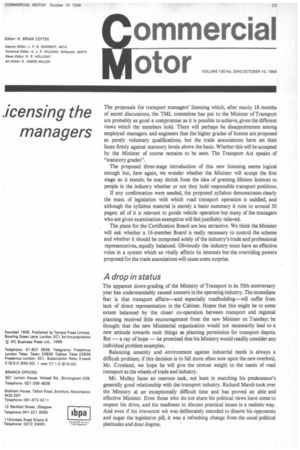ricensing the managers
Page 25

If you've noticed an error in this article please click here to report it so we can fix it.
The proposals for transport managers' licensing which, after nearly 18 months of secret discussions, the TML committee has put to the Minister of Transport are probably as good a compromise as it is possible to achieve, given the different views which the members hold. There will perhaps be disappointment among employed managers and engineers that the higher grades of licence are proposed as purely voluntary qualifications, but the trade associations have set their faces firmly against statutory levels above the basic. Whether this will be accepted by the Minister of course remains to be seen. The Transport Act speaks of "statutory grades".
The proposed three-stage introduction of this new licensing seems logical enough but, here again, we wonder whether the Minister will accept the first stage as it stands; he may shrink from the idea of granting lifetime licences to people in the industry whether or not they hold responsible transport positions.
If any confirmation were needed, the proposed syllabus demonstrates clearly the mass of legislation with which road transport operation is saddled, and although the syllabus material is merely a basic summary it runs to around 30 pages; all of it is relevant to goods vehicle operation but many of the managers who are given examination exemption will feel justifiably relieved.
The plans for the Certification Board are less attractive. We think the Minister will ask whether a 16-member Board is really necessary to control the scheme and whether it should be composed solely of the industry's trade and professional representatives, equally balanced. Obviously the industry must have an effective voice in a system which so vitally affects its interests but the overriding powers proposed for the trade associations will cause some surprise.
A drop in status
The apparent down-grading of the Ministry of Transport in its 50th anniversary year has understandably caused concern in the operating industry. The immediate fear is that transport affairs—and especially roadbuilding—will suffer from lack of direct representation in the Cabinet. Hopes that this might be to some extent balanced by the closer co-operation between transport and regional planning received little encouragement from the new Minister on Tuesday; he thought that the new Ministerial organization would not necessarily lead to a new attitude towards such things as planning permission for transport depots. But — a ray of hope — he promised that his Ministry would readily consider any individual problem examples.
Balancing amenity and environment against industrial needs is always a difficult problem; if this decision is to fall more often now upon the new overlord, Mr. Crosland, we hope he will give the utmost weight to the needs of road transport as the wheels of trade and industry.
Mr. Mulley faces an onerous task, not least in matching his predecessor's generally good relationship with the transport industry. Richard Marsh took over the Ministry at an exceptionally difficult time and has proved an able and effective Minister. Even those who do not share his political views have come to respect his drive, and his readiness to discuss practical issues in a realistic way. And even if his irreverent wit was deliberately intended to disarm his opponents and sugar the legislative pill, it was a refreshing change from the usual political platitudes and dour dogma.
























































































































